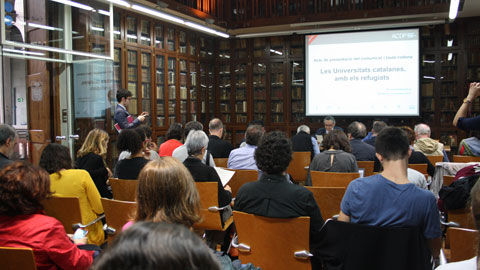Catalan universities: on the side of the refugees

13/10/2015
At the end of 2014 over 60 million people across the world had been forced to leave their homes by armed conflicts or persecution for reasons of gender, race or religion, according to the ACNUR report "World at War. Global Trends. Forced displacement in 2014".
There are multiple causes for this but the threat of violence is a common factor. Refugee movements, both within and beyond countries' borders, have the aim of finding a place to live with minimal conditions of respect for human rights and access to food, education, healthcare and employment. In the case of Syria, close on half the population have had to abandon their homes since 2012. Nearly seven million people have fled the country and are dispersed between the Lebanon (where one person in five is a Syrian refugee), Jordan, Turkey, Iraq and Egypt. The living conditions of these people are gradually deteriorating. As time passes, their vulnerability increases, reaching extreme proportions in the case of families headed by women. Women, children and the elderly, as always, are the ones who are suffering the most in this conflict.
Since 2014 the access routes to Europe via Italy and Greece have been literally inundated by people fleeing the extreme violence of the Syrian conflict, and also coming from Afghanistan (one in four refugees), the Yemen, Somalia, etc. Thousands of these people have fallen victim to mafias, and only the luckiest make it to Europe alive after a sea crossing. Close on 500,000 Syrians have arrived in Europe fleeing from extreme violence and the impossibility of living in decent conditions. In the face of this, our universities must show solidarity and, within our capacities, experience and possibilities, respond to a humanitarian crisis of a size that has not been seen in Europe since the Second World War.
Human progress, sustainability, and the protection of human rights are an inseparable part of universities' role in society. As spaces for analysis, reflection, new ideas, teaching, research, innovation, and creation and dissemination of knowledge, universities have a responsibility that we can and must exercise, from the firm conviction that respect for human rights and dignity is crucial to any progress towards a global society, enriched by diversity and capable of living in peace.
And from the firm conviction that human rights are based on mutual knowledge and respect, solidarity and cooperation we make the following statement.
1) The Catalan public universities that make up ACUP condemn the violence being inflicted on the people of Syria, both inside and outside Syrian territory. This violence is exerted both by the state's political and military agents and by those who claim legitimacy or control of the territory and therefore of the population, but also by states and institutions that infringe human rights and international humanitarian law by action or by omission.
2) We reject all this violence, especially that which affects women and children, and ethnic, religious or political minorities, apparent both in the conflict zone itself and in the countries receiving refugees.
3) Given that the conflict is not only internal but also regional and international in scale, and that any peace proposal must take all these aspects into account, we call on those involved in the conflict, whether directly or indirectly, to establish immediately the necessary conditions for reactivating peace talks and to include in these talks representatives of Syrian civil society, women in particular, taking their needs into account in any eventual agreements.
4) We urge international donors to play a major role in supporting international agencies, especially those of the United Nations, in the provision of humanitarian aid, a key element in restoring the people's living conditions and dignity.
5) We urge governments and public administrations to shoulder the moral responsibility for accepting persons who are fleeing from violence, and to promote dialogue and coordination with civil society in order to contribute to the welfare of those seeking refuge and asylum.
6) We express our firm commitment to the monitoring, enactment and defence of human rights and our solidarity with the suffering of the Syrian people and all those currently exposed to violence.
7) We have decided to work in coordination with civil society and the relevant public administration bodies to apply a programme of action that is effective, integrated and coherent, that upholds respect for human rights and favours the social, economic, educational, personal and work-related development of those seeking refuge and asylum, in the short, medium and long term. We will facilitate the active involvement of our respective university communities in actions and initiatives for the reception of refugees arriving in Catalonia, or those already here.
8) We reaffirm the commitment of the University as an institution and social actor to studying, reflecting and reporting on causes, actors, consequences, interventions by civil society, future challenges and proposals for action in relation to migration, and in particular to population movements caused by violence.
9) We reaffirm the need to effectively promote, disseminate and defend human rights and basic personal freedoms, from an inclusive standpoint that necessarily incorporates the perspective of gender, and that places great emphasis on children's right to education. To facilitate this, we will organise spaces and services to meet both specific and general needs identified, in coordination with other organisations and administrative bodies.
10) In accordance with the above points, we undertake to place our resources and skills at the disposal of the Refugee Support Committee and of all organisations and administrative bodies charged with receiving and integrating refugees in Catalonia. We undertake to make academic activities available to newly arrived refugees to the extent permitted by regulations, and we request that the competent administrative agencies speed up the processes for officially recognising academic qualifications, in order to facilitate refugees' access to university studies.
Barcelona, 13 October 2015
.